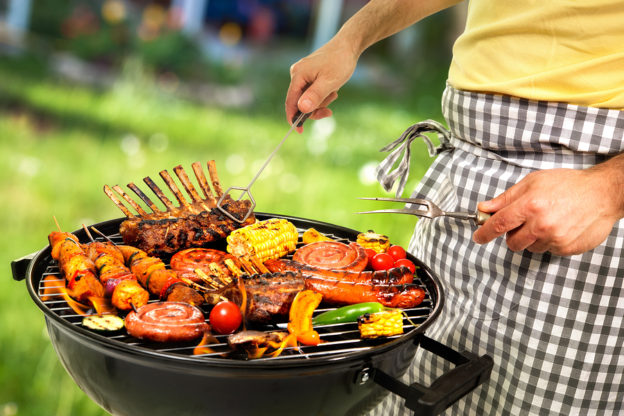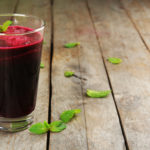By David Blyweiss, M.D., Advanced Natural Wellness
July 3, 2019
With the arrival of the 4th of July, grilling season is just beginning in many parts of the country. (Down here in South Florida, it never ends!)
I’ve enjoyed grilled steaks, ribs and chicken. They are even better when eaten outdoors surrounded by friends, family and neighbors.
But they come with a problem.
While grilling adds a rustic smoke flavor to meats, it can also change their chemical composition.
In particular, the high temperatures that put the “sear” or “char” on meats also release cancer-causing compounds, such as heterocyclic amines (HCAs) and polycyclic aromatic hydrocarbons (PAHs).
These substances are linked to many types of cancer; including cancers of the breast, prostate, colon, pancreas and stomach.
Open your arteries, improve blood flow for a new health miracle...
Did you know your circulatory system has over 60,000 miles of arteries, veins and other blood vessels, if stretched end to end?
But as you age, your blood vessels undergo changes, which may cause them to stiffen, thicken and get clogged.
GOOD NEWS! Doctors have now identified a “Miracle Molecule” inside your arteries that helps OPEN your arteries and IMPROVE blood flow.
It’s what Dr. Valentin Fuster calls it, "One of the most important discoveries in the history of cardiovascular medicine."To you, that means...
- Healthy blood pressure
- Sharper mind and memory
- Skyrocketing energy and muscular strength
- Increased pleasure and passion in the bedroom
- Improved circulation to every cell and organ in your body
Go here to discover a new natural way to significantly boost the levels of this miracle molecule in YOUR body NOW!
Grilling also produces something called advanced glycation products (AGEs). These are inflammatory glycotoxins that build up in your cells, tissue and organs. If you’re diabetic they accumulate even more quickly.
Nobody wants these dangerous by-products in their food. I certainly don’t.
But that doesn’t mean you can’t safely man the grill tomorrow – or during the rest of the summer months.
I have a number of safe, simple practices that can easily minimize the production of these hazardous chemicals while your meat is on the grill.
Man Your Grill with Healthy Confidence
One of the easiest ways to cut down on the production of dangerous compounds during cooking is to marinate your meats beforehand.
I personally use a combination of olive oil, lemon juice, onion and garlic. Not only does it work as a tenderizer, it is also absorbed into the meat fibers. And that’s where it does its magic.
Among all oils, extra virgin olive oil is the only one helps prevent the formation of HCAs when meat is cooked at high heat. Better yet, a combination of one part lemon juice and two parts each of onion and garlic can slash HCA production by about 70%.
I use all four ingredients, and often add other spices to the mix. Then, I drown the meat in it and stick the whole kit and caboodle in the fridge for a couple of hours before tossing it on the grill. I find that this is an extremely simple and practical way to tenderize and improve the safety profile of my grilled meat.
You can also use beer as a marinade. I’ve never tried it, but the evidence is very clear. All types of beer reduce the formation of HCAs. However, black beer appears to be the most effective. It inhibits about 90% HCA production.
Are You Suffering From...
- Love handles and a pot belly
- Romance that isn't what it used to
- Forgetfulness and inattention
- Low (or no) strength and endurance
- A sex drive that's shifted into neutral...or worse
If so...you may have Mature Male Burnout. Click here to discover more about this unique condition and what you can do about it.
Another thing to think about is that the extremely hot and dry heat produced by grills (and ovens) is what produces harmful substances.
This means that if you grill your meat at a lower temperature for a longer amount of time, there is less chance of charring and chemical production. Flipping the meat frequently helps, too.
And here’s another tip.
Any griller worth his or her salt watches carefully for flare-ups that can destroy a piece of meat in a heartbeat.
The best way to avoid this disaster (besides squirting the flame with water) is to trim off all the fat beforehand. Not only does it reduce flare-ups, it also decreases the production of cancer-causing chemicals.
You also have the option of par-cooking your meats.
Simmering ribs or chicken in a pot of seasoned water before tossing them on the grill greatly limits the amount of time they spend resting above flaming hot coals or propane generated flames. So they automatically produce fewer HCAs, PAHs and AGEs.
Other meats, like steaks and hamburgers, can be slowly pre-cooked in the oven before being placed on the grill. This is called “reverse searing”. You sear your meat at the end of the cooking cycle instead of the beginning, thus reducing the formation of dangerous compounds.
While this seems counter-intuitive, I have to admit. I’ve never experienced a difference in taste or texture between the two of them.
I also have another great tip that can send your cookout into over-drive.
When you cut your meats into smaller chunks they cook much faster. So you can quickly get it to the right temperature with less risk of chemicals being released.
This makes shish-ka-bobs a unique and tantalizing treat to add to your grill. Add onions, peppers and mushrooms and you have a meal on a stick! Your guests will love it, without even knowing you are protecting their health.
On a final note…
Please! If you use barbecue sauce, don’t add it while the meat is over high heat.
It can actually TRIPLE the levels of harmful substances after just 15 minutes of cook time.
So set it aside and use it as a dipping sauce. You, your friends, your family and your neighbors will be all the healthier for it.
And always remember to buy grass-fed, pasture-raised and wild-caught proteins that will support your health even further.
SOURCES:
Schor J. Marinades Reduce Heterocyclic Amines from Primitive Food Preparation Techniques. Natural Medicine Journal. 2010 Jul; 2(7).
Viegas O, et al. Influence of beer marinades on the reduction of carcinogenic heterocyclic aromatic amines in charcoal-grilled pork meat. Food Addit Contam Part A Chem Anal Control Expo Risk Assess. 2015;32(3):315-23.
Uribarri J, et al. Advanced Glycation End Products in Foods and a Practical Guide to Their Reduction in the Diet. J Am Diet Assoc. 2010 Jun; 110(6): 911–16.e12.







